Wish List preview: ‘heart-breaking, endearing, and bittersweet’
A character driven play investigating boundaries and life far from the Cambridge bubble

“The play works from the inwards out, not the outwards in.” When I sit down with the cast and directorial team of Wish List and ask them to get to its heart in the space of one sentence, this is the pleasingly incisive observation I get from Assistant Director Hannah Lyall.
Wish List, Katherine Soper’s 2015 Bruntwood Prize winner, is in many ways a long hard look at a number of the dark spots of our modern British society. It tells the story of Tamsin Carmody, barely an adult and forced to take on a zero-hours contract packing boxes in a warehouse in order to support herself and her housebound brother Dean, who suffers from a debilitating form of what is most likely obsessive compulsive disorder. The play examines ideas of class and mental illness that are already so often debated within Cambridge, but watching 19 year-old Tamsin (Billie Collins) find even the idea of completing her A Levels something close to a pipe dream, and Dean (Lucas Marsden-Smedley) struggle over and over to even leave his own room, reminds us of the slightly warped way in which we in university view these issues.
Every pause and breath and turn of phrase is directed by Murdoch with strict precision
“The first things we spoke about in rehearsal were these issues [of class and mental illness] and how best to treat them with sensitivity,” Director Jessica Murdoch tells me. Each member of the cast was directed to do research into things such as the benefits system and mental health in order to portray as accurately as possible the issues being explored. But while no one working on Wish List is in any doubt as to the importance of these issues (the production itself will be collecting donations for CPSL Mind https://www.cpslmind.org.uk/ after each performance), it is the characters that they insist are at the very heart of the production.

The way the play is written lends itself to this focus on character with startlingly naturalistic dialogue between its four actors, who, in testament to both their skill and the script, seem less to be “acting” and more to be slipping into parts already written for them. Every pause and breath and turn of phrase is directed by Murdoch with strict precision, but, she and Lyall tell me, the advantage of having cast the show before the end of Lent Term is that a dialogue was established between actors and director. The actors have, for months, been allowed to inhabit and examine the characters they play, and now clearly know, and talk about, them as though they were living, breathing people. Particularly delightful are the relationships that result from this. Soper’s script examines a sibling relationship; something that Collins notes rarely takes centre-stage in theatre. Similarly, Murdoch’s decision to not only cast Hannah Shury-Smith as the sunny, ebullient Luke, but to have Luke be a woman in the context of the play, (a decision she described as not being entirely active, but rather “just falling into place as a concept”), allows for a subtly portrayed and refreshingly positive queer narrative to ease into the essence of the play and lodge itself there, just as Luke herself edges into Tamsin and Dean’s lives.
This intimacy between the actors bleeds into the production itself and is naturally suited to the setting of the Corpus Playroom. It makes Wish List the latest in a long line of character-focused plays to have occupied this term’s season at Corpus, but the play also negotiates the idea of barriers, locations, and boundaries. Characters are constantly separated from each other throughout Wish List. As Marsden-Smedley puts it, much of the play centres on “people being stuck in places” and attempts to negotiate and move out of those limitations. Murdoch cites this as her and Lyall’s biggest challenge when first considering how to stage the show; negotiating this idea of boundaries while having their actors essentially all in the same small space. Ultimately, Wish List requires not only a split-stage that allows the worlds of warehouse and apartment to come together (in a set carefully designed by Claire Yuanqing Zhang), but the co-operation of the audience in imagining these barriers and the way in which they blur, both literally and metaphorically. Even when the characters isolate themselves or separate out, they are never more than a few feet away from the audience, or from each other.
It is this paradox that ultimately gets to the foundations of Wish List and the way in which it works on its audience. The situations portrayed can often feel miles away from a Cambridge audience. The relationships and characters that are in those situations, however, are familiar in a way that is all at once heart-breaking, endearing, and bittersweet.
Wish List is on at the Corpus Playroom, 12-16 June
 Features / How sweet is the en-suite deal?13 January 2026
Features / How sweet is the en-suite deal?13 January 2026 Comment / Will the town and gown divide ever truly be resolved?12 January 2026
Comment / Will the town and gown divide ever truly be resolved?12 January 2026 News / 20 vet organisations sign letter backing Cam vet course13 January 2026
News / 20 vet organisations sign letter backing Cam vet course13 January 2026 Arts / Fact-checking R.F. Kuang’s Katabasis13 January 2026
Arts / Fact-checking R.F. Kuang’s Katabasis13 January 2026 Music / Inside Radiohead’s circle13 January 2026
Music / Inside Radiohead’s circle13 January 2026










